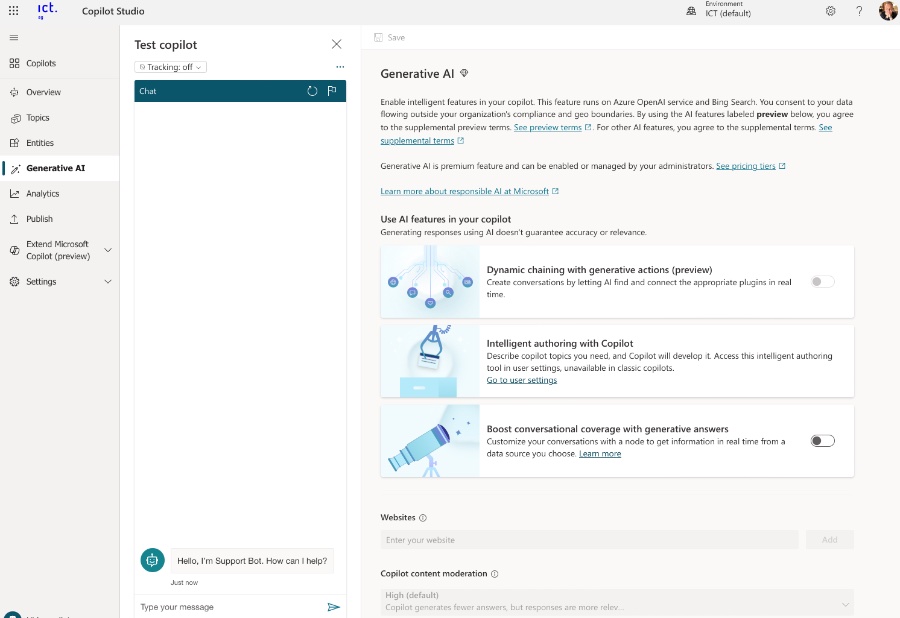- All of Microsoft
Create Smart AI Agents with Copilot Studio Features
Harness AI to craft smart conversational interfaces with Copilot Studios generative actions and dynamic plugins.
Key insights
Microsoft's advancements in AI have culminated in the Copilot Studio, offering a sophisticated way to develop conversation-based interfaces. By introducing generative actions and dynamic chaining, Copilot Studio has transcended traditional chatbots into more intelligent agents capable of intuitive interactions.
Generative actions in Copilot Studio work by describing a topic's function, which the system then matches with user queries. These actions leverage GPT technology to understand user intent and select appropriate responses, simplifying the conversation design process for creators.
Dynamic chaining allows for a fluid conversational experience by linking multiple relevant topics in response to complex or multi-faceted user queries. This feature enables Copilot to seamlessly provide comprehensive answers by combining different topics.
Plugin actions extend Copilot's capabilities by enabling interactions with external systems. These plugins can be based on prebuilt connectors or custom actions, and with the help of AI, they can provide contextually relevant responses to users' questions.
Despite the innovative AI features in Copilot Studio, topic authoring still requires a hands-on approach for business-critical conversations. Microsoft provides a detailed implementation guide with best practices for optimally using Copilot Studio's capabilities.
- Copilot Studio's innovative AI enables more intelligent and intuitive chatbot interactions.
- Generative actions use AI to select appropriate responses based on topic descriptions rather than specific trigger phrases.
- Dynamic chaining enhances user experience by sequentially triggering relevant topics.
- Plugin actions connect Copilot with external systems, allowing for detailed and customized user assistance.
- Manual topic authoring remains necessary for ensuring optimal performance in critical conversational paths.

The Evolution of Conversational AI
Conversational AI has significantly evolved with the development of technologies like Microsoft's Copilot Studio. This advancement allows users to engage in conversations with AI that are more human-like and intuitive. Through the use of generative AI, the conversation is not just based on predetermined paths but can dynamically adapt to the context of the user's input. The sophisticated combination of plug-and-play integrations with other systems and robust features such as dynamic chaining enriches the interactive experience. These new-generation chatbots, or "copilots," are becoming essential in fields ranging from customer service to interactive learning environments. Companies looking to integrate intelligent conversational agents can benefit from the power Copilot Studio brings to the realm of chatbot technology.
Microsoft has introduced exciting advancements in chatbot technologies, transforming them into what are now referred to as copilots. With the introduction of Copilot Studio, these AI-driven conversational agents have become more intuitive and are capable of intelligent interactions. A key feature of these copilots is their ability to integrate external data sources and use this data to provide automated answers.
As Timo Pertilä from Forward Forever explains, the capabilities of these copilots have expanded beyond responding to queries with pre-existing information. They can now learn to perform tasks within connected systems based on user prompts. This functionality marks the evolution of copilots from simple chat tools into sophisticated AI agents capable of dynamic operations.
In the Copilot Studio, you'll find central concepts such as topics versus generative actions, copilot plugins, and dynamic chaining. These core ideas are important for understanding how modern copilots are constructed. Previously, conversation topics had to be meticulously crafted to enable natural dialog flow, but now, through AI integration, this process has changed significantly.
Generative actions are a game-changer, as they allow the AI to decide which conversation topic to select based on the dialogue, without requiring pre-written trigger phrases. This feature is still in preview, but it has the potential to greatly simplify the copilot building process. With this, designers can focus on describing the actions of topics, making maintenance easier and user interactions more fluid.
When it comes to copilot plugins and dynamic chaining, the blog post describes how these features enable copilots to handle complex queries by triggering multiple topics in sequence. This advanced functionality allows for more comprehensive responses to user requests. Copilot Studio provides a new tracing mode to visualize this dynamic chaining in action.

People also ask
How do you create content with copilot?
Creating content with Copilot in Microsoft 365 involves leveraging the AI-powered tool to assist in drafting emails, documents, presentations, and more. Copilot is designed to understand the context and nuance of what the user is working on. To use it, you simply start by typing a prompt or a few key points in your Microsoft 365 application, like Word or Outlook. Copilot then generates suggestions, drafts, or creative ideas that you can edit, refine, or expand upon. It streamlines the content creation process, making it more efficient and helping users to overcome writer's block or generate ideas quickly.
What is a session in power virtual agents?
A session in Power Virtual Agents refers to an interaction between the virtual agent and a user that starts when a user begins a conversation and ends when the conversation concludes, typically through the resolution of the user's query or after a period of inactivity. Each session can encompass multiple turns of conversation, with the "turn" being the user's input and the virtual agent's response. Power Virtual Agents are designed to handle sessions dynamically, maintaining context over the conversation for a personalized and coherent user experience.
Keywords
Build Intelligent Agents Copilot Studio Generative Actions Plugins Dynamic Chaining AI Development Automation Innovation Conversational Interfaces Machine Learning Integration
